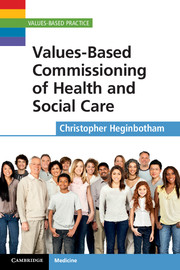Book contents
- Frontmatter
- Contents
- Acknowledgements
- Preface: Values-based Commissioning
- List of Abbreviations
- Chapter 1 Values-based practice in health and social care
- Chapter 2 Policy and practice
- Chapter 3 Health and social care reforms in England
- Chapter 4 Evidence and outcomes: commissioning for value
- Chapter 5 Patient and public involvement
- Chapter 6 The ‘new’ public health
- Chapter 7 Integrative commissioning for health and social care
- Chapter 8 Priority setting and resource allocation: values, ethics, evidence
- Chapter 9 Outcomes-led commissioning
- Chapter 10 Market stimulation and market shaping
- Chapter 11 Values-based leadership
- Endnote
- References
- Index
Chapter 3 - Health and social care reforms in England
Published online by Cambridge University Press: 05 July 2012
- Frontmatter
- Contents
- Acknowledgements
- Preface: Values-based Commissioning
- List of Abbreviations
- Chapter 1 Values-based practice in health and social care
- Chapter 2 Policy and practice
- Chapter 3 Health and social care reforms in England
- Chapter 4 Evidence and outcomes: commissioning for value
- Chapter 5 Patient and public involvement
- Chapter 6 The ‘new’ public health
- Chapter 7 Integrative commissioning for health and social care
- Chapter 8 Priority setting and resource allocation: values, ethics, evidence
- Chapter 9 Outcomes-led commissioning
- Chapter 10 Market stimulation and market shaping
- Chapter 11 Values-based leadership
- Endnote
- References
- Index
Summary
The health and social care reforms in England are an opportunity to develop an innovative programme that marries values and evidence and that is at once person-centred and clinically sound. Values-based practice is not dependent on the reforms: if the reforms did not occur, this would still be the right time to establish more effective processes of clinical commissioning; but conversely given that the reforms may occur, then the opportunity should be taken to improve the values basis of decision-making. Many burgeoning strands of action demonstrate this: the QIPP ‘Right Care’ programme (2011), an emphasis on shared decision-making, attempts to achieve integration, and a focus on GP-led clinical commissioning, all point to a gathering of opinion that will become an unstoppable force for change. Engaging GPs and other clinicians in an integrative process that encourages values-based and evidence-based practice as a shared approach to improving the doctor–patient and professional–service user relationships in the context of a population perspective.
Primary care commissioning:
Previous attempts at ensuring that evidence and local values were in harmony have had a mixed press. Since the advent of the internal market in 1991, a number of initiatives have been tried to get primary care physicians more engaged in commissioning. From fund-holding during the early 90s to practice-based commissioning, there has been a succession of mechanisms proposed, each of which has been found wanting by one section of society or another.
- Type
- Chapter
- Information
- Values-Based Commissioning of Health and Social Care , pp. 25 - 30Publisher: Cambridge University PressPrint publication year: 2012

